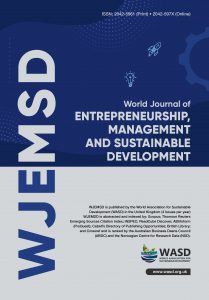Harnessing AI for Aligning Human Resource Management with Sustainability Goals to Enhance Workforce Productivity, Dr Prakash, Dr Franklin, Dr Anto Singh, Dr Rohini, Dr Loganatha
Assistant Professor, Faculty of Management
SRM Institute of Science and Technology
Ramapuram Chennai
ORCID: 0000-0003-4273-1496
Dr Franklin M
Assistant Professor, Faculty of Management,
SRM Institute of Science and Technology
Kattankulathur Chennai
ORCID: 0009-0009-0743-6177
Dr D. Anto Pravin Singh
Assistant Professor, Faculty of Management
SRM Institute of Science and Technology
Ramapuram Chennai
ORCID: 0000-0000-4221-8142
Dr V.Rohini
Associate Professor
SA Engineering College,
Chennai
ORCID: 0009-0008-3973-5238
Dr. Loganatha Prasanna. S
Assistant Professor, Faculty of Management
SRM Institute of Science and Technology
Ramapuram Chennai
ORCID: 0000-0002- 1696-1303
Type of paper: Research
Purpose: This research examines the influence of Artificial Intelligence-driven sustainable Human Resource Management (HRM) practices on employee engagement and performance within the Indian Information Technology sector. The study evaluates the impact of Sustainability Initiatives by Organizations (SUO) and Individuals (SUI), with Employee Engagement (EEG) as a mediator and Conscientiousness as a moderator in the relationship between sustainability and performance outcomes.
Design/Methodology/Approach:A cross-sectional survey was performed to collect data from 1,280 employees across prominent IT hubs in India, employing the Triple Bottom Line (TBL) and Ability-Motivation-Opportunity (AMO) frameworks. The hypotheses were tested using Structural Equation Modeling (SEM) and Confirmatory Factor Analysis (CFA) to validate the measurement and structural models.
Findings:The findings reveal that SUO and SUI significantly enhance EEG, which, in turn, positively influences Employee Performance (EPF). EEG partially mediates the relationship between sustainability initiatives and performance, while Conscientiousness moderates the strength of engagement outcomes. The results highlight how AI-enabled HRM strategies integrate sustainability to improve workforce productivity.
Research limitations/Implications:The study is limited to the Indian IT sector and employs a cross-sectional design, which restricts causal inferences. Future research should explore longitudinal and cross-industry analyses to broaden the applicability of findings. Further examination of mediators such as organizational culture and moderators like leadership styles can provide deeper insights.
Practical implications:The research offers actionable insights for managers and policymakers to embed AI tools into HRM processes, fostering sustainability, employee engagement, and tailored performance enhancements. Customized AI-driven strategies can address workforce diversity and advance organizational sustainability goals.
Originality/Value: This study contributes to the emerging field of AI-powered sustainable HRM by bridging theoretical models and practical applications. It offers innovative approaches for aligning HR processes with sustainability objectives, ultimately driving engagement and performance in dynamic markets.
Keywords: Artificial Intelligence-driven HRM; Work Performance; Conscientiousness; Sustainability Initiatives; Triple Bottom Line; Ability-Motivation-Opportunity Framework; Indian IT Sector; Sustainable HRM Practices; Structural Equation Modeling.
Citation:Prakash, K., Franklin, M., Anto Pravin Singh, D., Rohini, V., and Loganatha Prasanna, S. (2026).Harnessing AI for Aligning Human Resource Management with Sustainability Goals to Enhance Workforce Productivity. World Journal of Entrepreneurship, Management and Sustainable Development, Vol. 22, Nos 1-2, pp. xx-xx.


